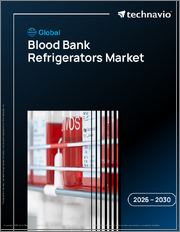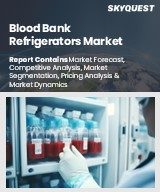
|
시장보고서
상품코드
1675711
RFID 혈액 냉장고 및 냉동고 시장 보고서 : 유형별, 용도별, 지역별(2025-2033년)RFID Blood Refrigerators and Freezers Market Report by Types (RFID Refrigerators, RFID Freezers), Applications (Hospitals and Diagnostic Centers, Blood Banks, and Others), and Region 2025-2033 |
||||||
RFID 혈액 냉장고 및 냉동고 시장 세계 시장 규모는 2024년 3억 3,190만 달러에 달했습니다. 앞으로 IMARC Group은 시장이 2033년까지 10억 6,990만 달러에 이르고, 2025-2033년 사이에 13.19%의 성장률(CAGR)을 나타낼 것으로 예측했습니다.
RFID(Radio Frequency Identification) 혈액 냉동고 및 냉장고는 혈장 유도체 및 적혈구(RBC)를 포함한 다양한 시약과 혈액 성분을 수집하고 안전하게 보관하는 첨단 온도 제어 저장 시스템을 말합니다. 이들은 상호 연결된 튜브, 모세관 튜브, 응축기, 팽창기, 증발기, 전동 압축기 및 냉장고의 온도 조절을 돕는 보온장치를 포함합니다. 일부 고급 모델은 구성, 압축기, 모터 및 변동 에너지 백업을 제공하는 비상 전원 시스템으로 추가로 구성됩니다. RFID 혈액 냉장고 및 냉동고는 중요한 혈소판 성분과 그 상태를 실시간으로 추적하고 식품 의약국(FDA) 규정을 준수하는 제품 품질을 유지할 수 있습니다. 이 외에도 RFID는 지능적이며 안전하게 사용할 수 있으며 신뢰성이 높고 기술적 오류를 최소화하며 비즈니스 효율성을 향상시킵니다. 그 결과 RFID 혈액 냉장고 및 냉동고는 병원 및 진단센터에서 검사, 저장, 수송 및 수혈 목적으로 혈액 보관에 사용됩니다.
RFID 혈액 냉장고 및 냉동고 시장 동향 :
백혈병, 살라세미아, 혈우병을 포함한 다양한 만성 질환의 유병률 증가와 수술 후 출혈 증가 등이 주로 시장 성장을 견인하고 있습니다. 이에 따라 실험과 세포기능 평가를 위해 혈장, 샘플, 혈소판을 입수하기 위한 병원 내 혈액뱅크의 필요성이 높아지고 있는 것이, 이 시장에서의 제품 수요를 촉진하고 있습니다. 또한, 내식성 강철과 손잡이로 구성된 서랍 랙을 갖춘 고급 혈액 냉동 냉장고의 출현은 또 다른 성장 촉진요인으로 작용합니다. 이러한 제품은 식별 카드 홀더로 구성되어 랙 전체를 제거하지 않고도 다량의 혈액 튜브를 보관하고 회수할 수 있습니다. 게다가 정부와 비정부기구(NGO)가 헌혈의 장점과 오해에 대해 대중을 교육하기 위한 노력과 의식 향상 프로그램을 늘리고 있는 것도 시장 성장을 뒷받침하고 있습니다. 이 외에도 건강 관리 인프라의 상당한 개선, 지속적인 R&D 활동, 지속적인 제품 강화 및 다양화는 시장 성장을 적극적으로 자극하고 있습니다.
이 보고서에서 다루는 주요 질문
- 세계 RFID 혈액 냉장고 및 냉동고 시장은 지금까지 어떻게 추이해 왔는가?
- COVID-19는 세계 RFID 혈액 냉장고 및 냉동고 시장에 어떤 영향을 미쳤는가?
- 주요 지역 시장은?
- 유형별 시장 분석은?
- 용도별 시장 분석은?
- 업계의 밸류체인의 다양한 단계란?
- 업계의 주요 촉진요인과 도전은 무엇인가?
- 세계 RFID 혈액 냉장고 및 냉동고 시장의 구조와 주요 기업은?
- 업계 경쟁도는?
목차
제1장 서문
제2장 조사 범위와 조사 방법
- 조사의 목적
- 이해관계자
- 데이터 소스
- 1차 정보
- 2차 정보
- 시장 추정
- 상향식 접근
- 하향식 접근
- 조사 방법
제3장 주요 요약
제4장 소개
- 개요
- 주요 업계 동향
제5장 세계의 RFID 혈액 냉장고 및 냉동고 시장
- 시장 개요
- 시장 실적
- COVID-19의 영향
- 시장 예측
제6장 시장 분석 : 유형별
- RFID 냉장고
- RFID 냉동고
제7장 시장 분석 : 용도별
- 병원 및 진단센터
- 혈액은행
- 기타
제8장 시장 분석 : 지역별
- 북미
- 미국
- 캐나다
- 아시아태평양
- 중국
- 일본
- 인도
- 한국
- 호주
- 인도네시아
- 기타
- 유럽
- 독일
- 프랑스
- 영국
- 이탈리아
- 스페인
- 러시아
- 기타
- 라틴아메리카
- 브라질
- 멕시코
- 기타
- 중동 및 아프리카
- 시장 분석 : 국가별
제9장 SWOT 분석
- 개요
- 강점
- 약점
- 기회
- 위협
제10장 밸류체인 분석
제11장 Porter's Five Forces 분석
- 개요
- 구매자의 협상력
- 공급기업의 협상력
- 경쟁도
- 신규 참가업체의 위협
- 대체품의 위협
제12장 가격 분석
제13장 경쟁 구도
- 시장 구조
- 주요 기업
- 주요 기업 프로파일
- Angelantoni Life Science Srl
- Biomed Global
- Cardinal Health Inc.
- IQM AS
- MedSella(MedFlow Clinical Ltd.)
- Qingdao Haier Biomedical Co Ltd.
- Rollex Group Australia PTY Ltd.
- SATO Vicinity Pty Ltd.(SATO Holdings Corporation)
- Spacecode Technologies
- Terso Solutions Inc.(Promega Corporation)
- Thalheimer Kuhlung GmbH & Co KG
- Venture Research Inc.
The global RFID blood refrigerators and freezers market size reached USD 331.9 Million in 2024. Looking forward, IMARC Group expects the market to reach USD 1,069.9 Million by 2033, exhibiting a growth rate (CAGR) of 13.19% during 2025-2033.
Radio frequency identification (RFID) blood refrigerators and freezers refer to advanced temperature-controlled storage systems that collect and safely preserve various reagents and blood components, including plasma derivatives and red blood cells (RBCs). They encompass interconnected tubing, a capillary tube, a condenser, expansion, an evaporator, electrically powered compressors, and a thermostat that helps regulate refrigerator temperature. Some advanced models further comprise configurations, compressors, motors, and emergency power systems to provide energy backup during fluctuations. RFID blood refrigerators and freezers allow real-time tracking of critical platelet components and their conditions and maintain the product quality to comply with food and drug administration (FDA) regulations. Apart from this, they are intelligent, safe to use, and reliable and aid in minimizing technical errors and increasing operational efficiency. As a result, RFID blood refrigerators and freezers are used by hospitals and diagnostic centers to store blood for testing, storing, transporting, and transfusion purposes.
RFID Blood Refrigerators and Freezers Market Trends:
The increasing prevalence of various chronic diseases, including leukemia, thalassemia, and hemophilia, and the rising incidences of blood loss post-surgical procedures are primarily driving the market growth. In line with this, the escalating need for blood banks in hospital settings to obtain plasma, samples, and platelets for conducting experiments and assessing cell functions is facilitating the product demand in the market. Additionally, the advent of advanced blood refrigerators and freezers with drawer racks composed of corrosion-resistant steel and handles is acting as another growth-inducing factor. Such products consist of identification cardholders, and they enable the storage of blood tubes in excessive amounts and their retrieval without the removal of the entire rack. Moreover, increasing initiatives and awareness programs by governments and non-governmental organizations (NGOs) toward educating the masses on the benefits and misconceptions of blood donation are favoring the market growth. Apart from this, significant improvements in the healthcare infrastructure, ongoing research and development (R&D) activities, and continuous product enhancements and diversification are positively stimulating the market growth.
Breakup by Types:
- RFID Refrigerators
- RFID Freezers
Breakup by Applications:
- Hospitals and Diagnostic Centers
- Blood Banks
- Others
Breakup by Region:
- North America
- United States
- Canada
- Asia-Pacific
- China
- Japan
- India
- South Korea
- Australia
- Indonesia
- Others
- Europe
- Germany
- France
- United Kingdom
- Italy
- Spain
- Russia
- Others
- Latin America
- Brazil
- Mexico
- Others
- Middle East and Africa
Competitive Landscape:
The competitive landscape of the industry has also been examined along with the profiles of the key players being Angelantoni Life Science Srl, Biomed Global, Cardinal Health Inc., IQM AS, MedSella (MedFlow Clinical Ltd.), Qingdao Haier Biomedical Co Ltd., Rollex Group Australia PTY Ltd., SATO Vicinity Pty Ltd. (SATO Holdings Corporation), Spacecode Technologies, Terso Solutions Inc. (Promega Corporation), Thalheimer Kuhlung GmbH & Co KG and Venture Research Inc. Kindly, note that this only represents a partial list of companies, and the complete list has been provided in the report.
Key Questions Answered in This Report:
- How has the global RFID blood refrigerators and freezers market performed so far and how will it perform in the coming years?
- What has been the impact of COVID-19 on the global RFID blood refrigerators and freezers market?
- What are the key regional markets?
- What is the breakup of the market based on the types?
- What is the breakup of the market based on the applications?
- What are the various stages in the value chain of the industry?
- What are the key driving factors and challenges in the industry?
- What is the structure of the global RFID blood refrigerators and freezers market and who are the key players?
- What is the degree of competition in the industry?
Table of Contents
1 Preface
2 Scope and Methodology
- 2.1 Objectives of the Study
- 2.2 Stakeholders
- 2.3 Data Sources
- 2.3.1 Primary Sources
- 2.3.2 Secondary Sources
- 2.4 Market Estimation
- 2.4.1 Bottom-Up Approach
- 2.4.2 Top-Down Approach
- 2.5 Forecasting Methodology
3 Executive Summary
4 Introduction
- 4.1 Overview
- 4.2 Key Industry Trends
5 Global RFID Blood Refrigerators and Freezers Market
- 5.1 Market Overview
- 5.2 Market Performance
- 5.3 Impact of COVID-19
- 5.4 Market Forecast
6 Market Breakup by Types
- 6.1 RFID Refrigerators
- 6.1.1 Market Trends
- 6.1.2 Market Forecast
- 6.2 RFID Freezers
- 6.2.1 Market Trends
- 6.2.2 Market Forecast
7 Market Breakup by Applications
- 7.1 Hospitals and Diagnostic Centers
- 7.1.1 Market Trends
- 7.1.2 Market Forecast
- 7.2 Blood Banks
- 7.2.1 Market Trends
- 7.2.2 Market Forecast
- 7.3 Others
- 7.3.1 Market Trends
- 7.3.2 Market Forecast
8 Market Breakup by Region
- 8.1 North America
- 8.1.1 United States
- 8.1.1.1 Market Trends
- 8.1.1.2 Market Forecast
- 8.1.2 Canada
- 8.1.2.1 Market Trends
- 8.1.2.2 Market Forecast
- 8.1.1 United States
- 8.2 Asia-Pacific
- 8.2.1 China
- 8.2.1.1 Market Trends
- 8.2.1.2 Market Forecast
- 8.2.2 Japan
- 8.2.2.1 Market Trends
- 8.2.2.2 Market Forecast
- 8.2.3 India
- 8.2.3.1 Market Trends
- 8.2.3.2 Market Forecast
- 8.2.4 South Korea
- 8.2.4.1 Market Trends
- 8.2.4.2 Market Forecast
- 8.2.5 Australia
- 8.2.5.1 Market Trends
- 8.2.5.2 Market Forecast
- 8.2.6 Indonesia
- 8.2.6.1 Market Trends
- 8.2.6.2 Market Forecast
- 8.2.7 Others
- 8.2.7.1 Market Trends
- 8.2.7.2 Market Forecast
- 8.2.1 China
- 8.3 Europe
- 8.3.1 Germany
- 8.3.1.1 Market Trends
- 8.3.1.2 Market Forecast
- 8.3.2 France
- 8.3.2.1 Market Trends
- 8.3.2.2 Market Forecast
- 8.3.3 United Kingdom
- 8.3.3.1 Market Trends
- 8.3.3.2 Market Forecast
- 8.3.4 Italy
- 8.3.4.1 Market Trends
- 8.3.4.2 Market Forecast
- 8.3.5 Spain
- 8.3.5.1 Market Trends
- 8.3.5.2 Market Forecast
- 8.3.6 Russia
- 8.3.6.1 Market Trends
- 8.3.6.2 Market Forecast
- 8.3.7 Others
- 8.3.7.1 Market Trends
- 8.3.7.2 Market Forecast
- 8.3.1 Germany
- 8.4 Latin America
- 8.4.1 Brazil
- 8.4.1.1 Market Trends
- 8.4.1.2 Market Forecast
- 8.4.2 Mexico
- 8.4.2.1 Market Trends
- 8.4.2.2 Market Forecast
- 8.4.3 Others
- 8.4.3.1 Market Trends
- 8.4.3.2 Market Forecast
- 8.4.1 Brazil
- 8.5 Middle East and Africa
- 8.5.1 Market Trends
- 8.5.2 Market Breakup by Country
- 8.5.3 Market Forecast
9 SWOT Analysis
- 9.1 Overview
- 9.2 Strengths
- 9.3 Weaknesses
- 9.4 Opportunities
- 9.5 Threats
10 Value Chain Analysis
11 Porters Five Forces Analysis
- 11.1 Overview
- 11.2 Bargaining Power of Buyers
- 11.3 Bargaining Power of Suppliers
- 11.4 Degree of Competition
- 11.5 Threat of New Entrants
- 11.6 Threat of Substitutes
12 Price Analysis
13 Competitive Landscape
- 13.1 Market Structure
- 13.2 Key Players
- 13.3 Profiles of Key Players
- 13.3.1 Angelantoni Life Science Srl
- 13.3.1.1 Company Overview
- 13.3.1.2 Product Portfolio
- 13.3.2 Biomed Global
- 13.3.2.1 Company Overview
- 13.3.2.2 Product Portfolio
- 13.3.3 Cardinal Health Inc.
- 13.3.3.1 Company Overview
- 13.3.3.2 Product Portfolio
- 13.3.3.3 Financials
- 13.3.3.4 SWOT Analysis
- 13.3.4 IQM AS
- 13.3.4.1 Company Overview
- 13.3.4.2 Product Portfolio
- 13.3.5 MedSella (MedFlow Clinical Ltd.)
- 13.3.5.1 Company Overview
- 13.3.5.2 Product Portfolio
- 13.3.6 Qingdao Haier Biomedical Co Ltd.
- 13.3.6.1 Company Overview
- 13.3.6.2 Product Portfolio
- 13.3.7 Rollex Group Australia PTY Ltd.
- 13.3.7.1 Company Overview
- 13.3.7.2 Product Portfolio
- 13.3.8 SATO Vicinity Pty Ltd. (SATO Holdings Corporation)
- 13.3.8.1 Company Overview
- 13.3.8.2 Product Portfolio
- 13.3.9 Spacecode Technologies
- 13.3.9.1 Company Overview
- 13.3.9.2 Product Portfolio
- 13.3.10 Terso Solutions Inc. (Promega Corporation)
- 13.3.10.1 Company Overview
- 13.3.10.2 Product Portfolio
- 13.3.11 Thalheimer Kuhlung GmbH & Co KG
- 13.3.11.1 Company Overview
- 13.3.11.2 Product Portfolio
- 13.3.12 Venture Research Inc.
- 13.3.12.1 Company Overview
- 13.3.12.2 Product Portfolio
- 13.3.1 Angelantoni Life Science Srl
Kindly, note that this only represents a partial list of companies, and the complete list has been provided in the report.



















